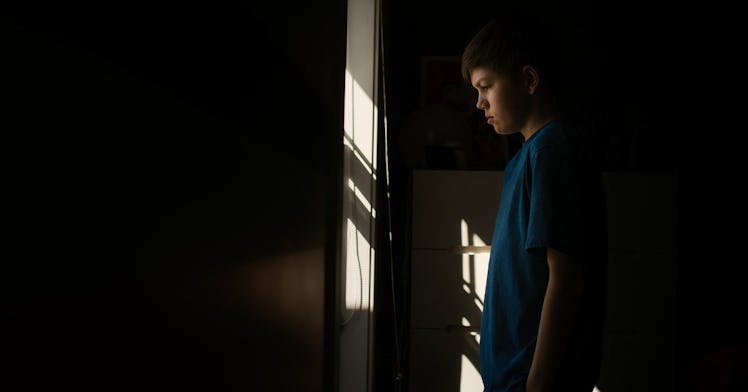Authoritarian Parenting: How Forced Compliance Backfires
When parents value control over a secure relationship with their child, it’s time to rework the discipline toolbox.

Ruling with an iron fist may force compliance from kids, but authoritarian parenting tends to backfire as children mature into teenagers and adults. An unwillingness to compromise combined with tactics like yelling or shaming make parents look like drill sergeants to their children. In other words, authoritarian parenting creates an environment where obedience is valued over nurture.
“Kids who are raised by authoritarian parents run the risk of low social functioning and are at increased risk of mental illness,” says Julian Lagoy, M.D., a psychiatrist at Community Psychiatry + MindPath Care Centers in California. “This can include anxiety, depression, and substance abuse.” And unfortunately, this parenting style is part of a cycle. “Kids who grow up with authoritarian parents are more likely to become authoritarian parents themselves someday,” Lagoy says.
What Is Authoritarian Parenting?
Three main parenting styles were first identified in the 1960s by psychologist Diana Baumrind, Ph.D., at the University of California, Berkeley. She observed that all parents strike some kind of balance between the demands they place on their kids and the care they show them. Using that measure – expectation vs. caregiving – Baumrind categorized parenting into three broad types: authoritarian, permissive, and authoritative.
In Baumrind’s model, permissive parents attend to their child’s needs but demand very little from them. At the other end of the spectrum, authoritarian parents demand a great deal from their children and provide little in the way of nurturing and positive feedback. For Baumrind, the parenting-paradigm sweet spot is authoritative: parents who expect a lot from their kids but also meet the specific needs of each of their children.
Although authoritative parenting and authoritarian parenting may sound similar, they’re worlds apart. Authoritative parents meet their child’s needs, but under the authoritarian style, parental needs take precedence. And because authoritarian parents prioritize control over relationships, they also tend to punish their child’s mistakes harshly.
Kids misbehave and make mistakes. Ideally, parents respond in a way that gives them the space to learn from those mistakes, reinforcing values and helping kids develop self-regulation. But children who grow up with authoritarian parents are less likely to learn those lessons — phrases like “Because I said so!” do nothing to help kids understand a parent’s rationale or the value system in which they’re living.
In its extreme manifestations, the demanding, strict, and rigid nature of authoritarian parenting can lead to abuse. Although almost all abusive parents fall into this category, Baumrind’s theory doesn’t classify all authoritarian parents as abusive.
Children of authoritarian parents are more likely to become authoritarian parents themselves, Lagoy says. And because children raised in authoritarian homes can be aggressive, rebellious, resentful, and have a difficult time managing their anger, it’s easy to see how parents pass this style down from generation to generation.
Becoming a Less Authoritarian Parent
Parenting can be frustrating, and that frustration comes in waves. When nothing in the disciplinary toolbox seems to be working, authoritarian tactics can seem like the emergency brake you need. Even parents who are operating from a healthy place are susceptible to using authoritarian tactics at times. When that happens, apologize to your kids for screwing up and move on.
“Parents should be upfront with their children and explain that parenting is also partially a learned trait, and they are trying their best to be the best parent possible,” Lagoy says. But progress is not perfection, so parents need to continue to acknowledge missteps. It may be difficult for an authoritarian parent to listen without defensiveness if a child expresses resentment or sadness over how the authoritarian parent has treated them. But it’s critical to the healing process.
Parents also need to check in with each other often and offer mutual support. “An authoritarian parent’s partner or co-parent should have frequent conversations with them and give constructive advice, when possible, on how they can be more supportive,” Lagoy says. “They should try not to be negative, but rather be more positive, patient, supportive, and understanding.”
If adopting a whole new approach to parenting sounds daunting, remember that it’s all about working on one new habit until it starts to feel natural, then adding another when you’re ready. Since Baumrind’s model focuses on what parents offer and expect from their kids, working on improving those particular skills is a great place to start. Practice being attentive to your child’s particular needs, and experiment with adjusting your expectations. Self-reflection is also necessary. Although self-awareness and self-control play a large part in managing anger and frustration, understanding what triggers those emotions can keep the rage cycle from starting in the first place.
The shift away from authoritarian parenting isn’t easy, but it’s worthy the effort as it opens up a much healthier future for kids, who can start operating from a place of security rather than fear.
This article was originally published on